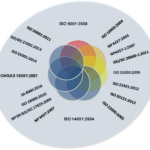The growing needs of information make the librarians to think in a logical way so as to satisfy the users at large. Library is the centre of any academic institution. While class room teaching provides for learning, the libraries disseminate a wide range of knowledge required to excellent and intellectual heights. Libraries supplement the instructional work of class rooms and carry forward the ideals of education. Thus, the libraries provide the informal education, guiding the learners to search vast range of material available. The libraries are gradually being recognized for their academic services and they are occupying prominent position in education, throughout the world (Sivankalai and Yadav, 2012).
Since, the libraries are information providers, import knowledge by means of meticulous reference, sometimes they are termed as information centers or knowledge centre. Quality based organizations should strive to achieve perfection by continuously improving the business and production process. Of course, perfection is impossible because the race is never over; however, we must continually strive for its attainment. TQM is a method by which management and employees can become involved in the continuous improvement of the production of goods and services.
In early 1980s, good number of studies were made on automated data validation, error rates and patterns, authority control which belongs to quality control in online databases. However, customer and employee satisfaction are seldom in focus.
The quality assurance initiative in LIS has primarily come from the parent organisation to which it provides services. However, in the later years, the quality assurance system has become as an essential feature of LIS management. Quality studies in LIS sector are mostly isolated and are made on different aspects of library management, services, user-studies etc. The evidence produced by the few TQM cases in the LIS sector indicates that TQM is highly relevant management theory for information sector.
Many librarians still hold a rather myopic view that their services and products are so essential that people will use them as they have always done without any additional effort on their part. They erroneously assume that users’ needs are also satisfied because they come to use the library. Unfortunately however, although librarians may regard libraries as indispensable, it is by no means certain that those outside the profession share this view. This aversion however seems strange, since marketing like librarianship places the user at the centre of all activities. It is thus very essential that the marketing concept is wholly and quickly adopted if libraries are to continue to exist as information providers in the future (Weingard, 1995).
A controversy over the expansion of TQM into service-oriented organizations (such as libraries) has to do with the question of profit making. Business as we all know, are designed to make profit. Libraries, unfortunately, are not profit-making ventures and are considered to offer “free” service. It should be noted, however, that libraries, be they public, academic or research are not ‘free’. Customers may not be paying directly for the use of the library but are entitled to the service because their taxes, school fees, the contributions and membership subscriptions of the organizations they serve, coupled with grants of various types donated to the libraries, are good enough reasons for them to be managed efficiently. Accountability is crucial both in the business sector in general and in the library in particular. This is yet another justification for the applicability of TQM to businesses and libraries. Another reason why libraries should adopt TQM is that it (TQM) embodies certain values and approaches, which are common and already established concepts in libraries. These include the elements of participative management, staff training and development and responsive service to customers (Clinton, 1994).


